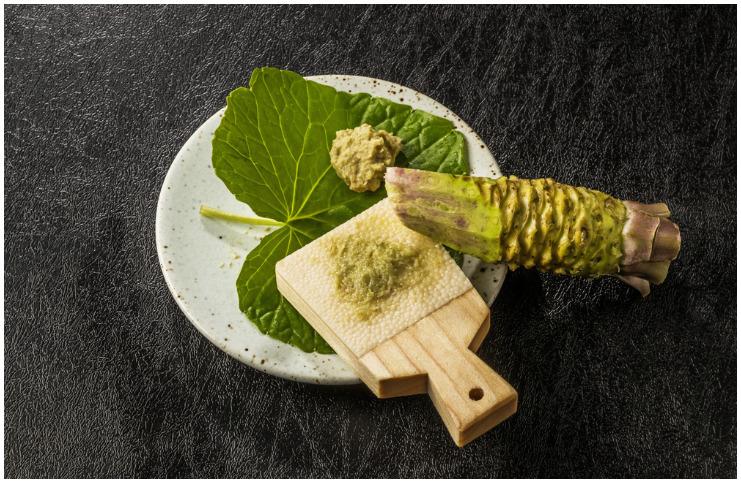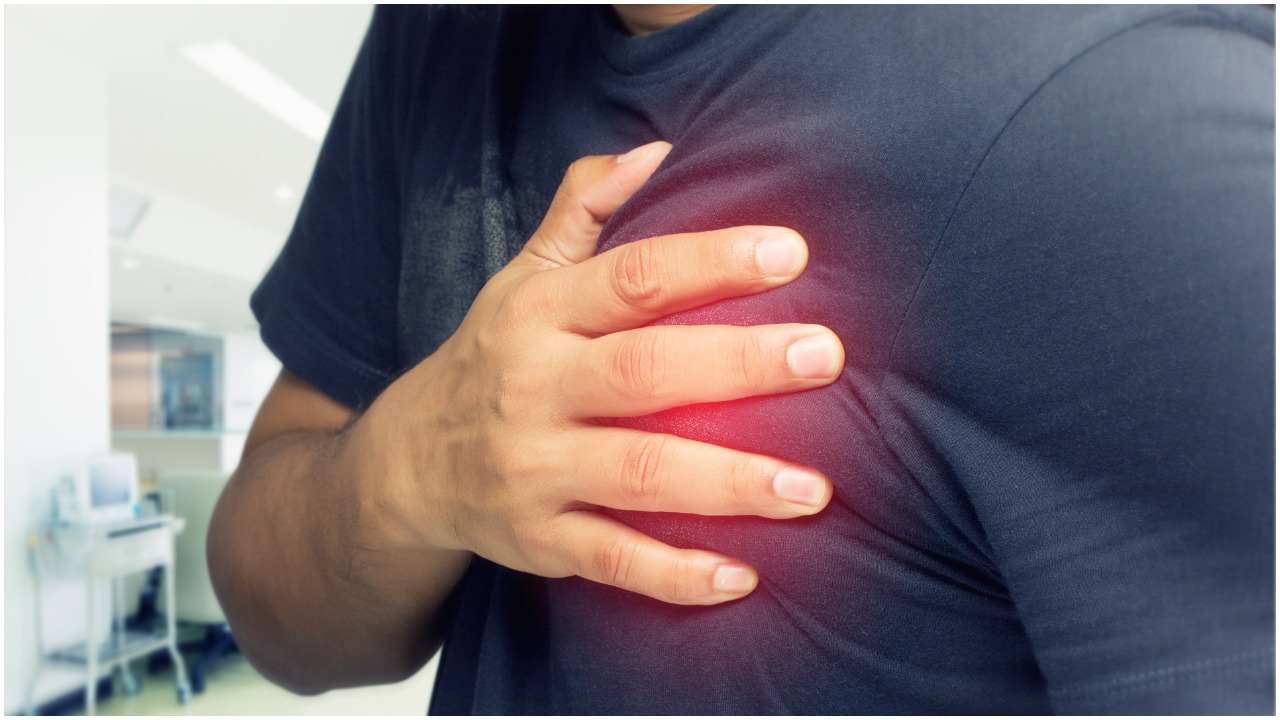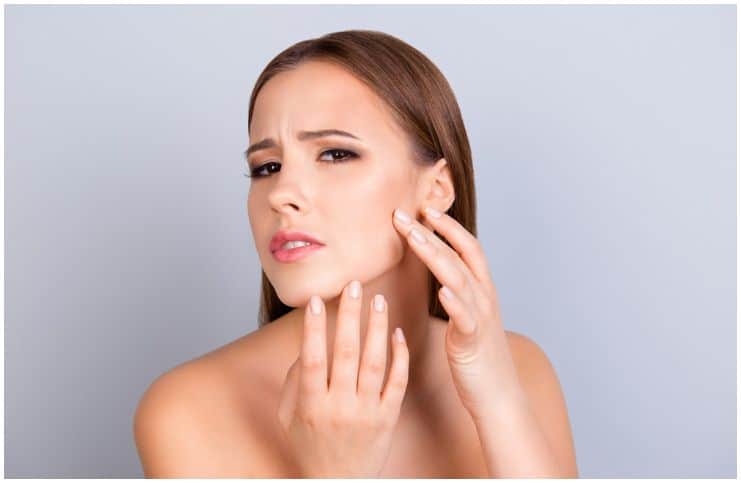Wasabi, also known as the Japanese horseradish, is a member of the Brassicaceae family (that includes mustard, turnip, cabbage, and cauliflower) and has been highly regarded for its medicinal properties since ancient times.
Native to Japan, it is now being cultivated in North America (particularly in British Columbia), New Zealand, and other parts of Asia.
Wasabi is considered one of the most difficult plants to grow (the growth cycle is between 18 months and three years) and extraordinarily expensive, costing $160 a kilogram at wholesale prices.
Many experts estimate that about 95 percent of Japanese horseradish sold in the United States is actually a mixture of mustard powder, horseradish powder, green food coloring, and cornstarch.
This plant, with the botanical name Wasabia japonica, is known for its extremely spicy flavor, similar to hot peppers, and specific flavor similar to horseradish, but much hotter.
When you eat this plant, the sensation is felt mostly in your nasal passage and can cause some amount of pain depending on the quantity you intake.
Nutrition facts
It contains minerals such as sodium, manganese, phosphorous, calcium, copper, zinc, magnesium, iron and potassium, while vitamins include – thiamin, riboflavin, niacin, vitamin C, vitamin A, folate (vitamin B9) and vitamin B6.
In addition, this plant has dietary fiber, protein and high levels of certain antioxidants, like isothiocyanates, which is the substance responsible for its strong odor.
Health Benefits of Wasabi
Cancer Prevention
Consuming this plant may possibly assist in diminishing the risks of developing some types of cancer, as it contains vegetable isothiocyanates (ITCs) which were found to improve the rate of elimination of the cancer cells having the p53 mutation.
Furthermore, the ITCs content activates the liver enzymes and clears harmful substances that can cause cancer.
Allergies
This plant possesses anti-inflammatory properties and appears useful for relieving symptoms of seasonal allergies. Experimenting with an allergic reaction is an all too familiar experience for many Americans, especially children.
Heart Health

Heart disease affects women and men of all ages and is the leading cause of death in the U.S., claiming about 1 million lives annually.
The anti-clotting properties of the Japanese horseradish make it a very good candidate when fighting heart conditions and stroke possibilities, particularly in the case of seniors.
However, the key to heart health is to avoid being sedentary and keep moving. Ideally, you should aim to get your heart rate up with at least 30 minutes of physical exercise at least 5 days a week.
Clears Blocked Sinuses Naturally
Many individuals experience nasal congestion from temperatures, allergies, dust, smoking, and air particles.
Since the odor of the plant is so potent, it takes only a few seconds of inhaling the scent for the nasal passages to clear.
Weight Loss
Better known as ”roughage,” fiber is the term that describes the carbohydrates that humans can’t digest. There are two types of fiber: insoluble and soluble.
Insoluble fiber cleanses the intestinal tract and colon, while soluble fiber absorbs LDL (bad) cholesterol and toxins. According to studies, dietary fiber can also bind to fat and protein, helping you lose weight.
Moreover, high-fiber foods take longer to chew so that you’re less likely to overeat, by giving your brain time to register feelings of satiety.
One cup of raw Japanese horseradish root contains 10.1 grams of fiber.
Infection Protection
A 2004 study at the Faculty of Marine Bioscience and Technology, South Korea, concluded that this plant has anti-microbial effects against Helicobacter pylori bacteria (you can get H. pylori from water, food, or utensils).
More importantly, in the study, the leaves of the plant showed the most antimicrobial potential.
Skin Health

Vitamin C (also known as ascorbic acid) is a water-soluble vitamin. Since the human body does not manufacture it, it must be obtained regularly from the diet. Vitamin C is found at high levels in the epidermis as well as in the dermis.
Vitamin C has an important role in collagen production, which helps keep your skin healthy. This is why ascorbic acid is one of the key compounds found in anti-aging skincare products.
One cup of raw Japanese horseradish root contains 54.5 milligrams of vitamin C (91% of the daily recommended value).
Wound Healing
Manganese is a trace mineral that is essential to life. It is involved in brain functioning, carbohydrate metabolism, reproduction, and wound healing.
One cup of raw Japanese horseradish root contains 0.5-milligram manganese (25% of the daily recommended value).
Manganese
Manganese is a naturally occurring mineral in the human body in very small amounts.
This mineral is essential for the healthy growth of human bone structure. Also, it has been scientifically proven to be effective in reducing common pains in the lower back and the knees. Manganese is also a potent antioxidant that scavenges the free radicals in the human body.
One cup of raw wasabi contains 0.5 milligrams of manganese, which is about 25 percent of the daily recommended value.
Side Effects of Wasabi
This plant contains a chemical component named hepatotoxin, which is not a problem when taken in small doses. Nevertheless, if you consume this plant in large amounts, your body may have some problems processing hepatotoxin, and, as a consequence, it will have a negative effect on the liver.
Consuming this plant combined with anti-inflammatory analgesics and high blood pressure medications can have some adverse effects. Therefore, it is advisable to see your doctor before consuming this plant.
Furthermore, individuals with esophageal reflux, ulcers, gastrointestinal disease, kidney disorders, or those using hormone replacement therapy, are also advised to consult with a healthcare specialist before consuming this plant.
Excessive consumption of Japanese horseradish can lead to excessive sweating, whitening of the face, confusion and even fainting.
Selection and Storage
Selects cool, fresh, unshriveled roots. Wrap these roots in damp towels and refrigerate when not being used. You can store it like this for approximately 30 days.
How to eat
You can consume it as a condiment, similarly to mustard or horseradish. Grinding and drying this root will produce a powder that has diminished properties and taste.
References https://www.jstage.jst.go.jp/article/jnsv/58/4/58_303/_pdf https://www.ncbi.nlm.nih.gov/pubmed/23760613 https://www.ncbi.nlm.nih.gov/pubmed/15246236 https://www.ncbi.nlm.nih.gov/pubmed/24575144







